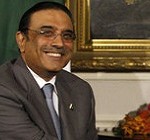This week, Pakistan will pass a milestone in the gradual process of consolidating civilian democracy. For the first time in the nation’s history, voters will elect a new government to succeed a civilian administration that served its full five-year term. Opinion polls suggest that the vote will bring a peaceful alternation of power from the ruling coalition to the opposition party led by Nawaz Sharif. Despite his political origins as a politician favored by the generals, Sharif is now a vocal advocate of civilian supremacy over the military. Judging by the campaign, the conduct of the electoral process, and its likely outcome, it is fair to conclude that Pakistan’s civil-military equation has begun to tilt in favour of the civilians.
There is other evidence of this trend as well. Pakistan’s electronic media, once the domain of a lonely, state-run PTV—is now a cacophonous mix of hugely popular cable channels. These channels, along with numerous print and online outlets, are more resistant to outright censorship than at any point in Pakistan’s past. The military still manipulates and intimidates journalists, but with somewhat less impunity. At the same time, civilian politicians are also actively engaged in cultivating (and sometimes buying) the media to serve their own purposes.
This broader and somewhat more level playing field for debate has recently exposed the military to unprecedented public criticism. For instance, after the U.S. raid on Osama bin Laden’s Abbottabad compound in May 2011, civilian commentators flayed Pakistan’s military and intelligence services for their inability to prevent the “double violation of territorial sovereignty,” first by the world’s most notorious terrorist, then by the American superpower.
Along similar lines, Pakistan’s civilian judiciary has repeatedly flexed its muscles at the military’s expense. Not only did the lawyers’ movement directly precipitate the collapse of Pervez Musharraf’s military-backed regime, but the energetic Chief Justice has in subsequent years dredged up issues—including the military’s abuse of Baloch detainees and the historical manipulation of elections by the chiefs of the army and intelligence services—that have further pushed the civil-military balance. Today, Musharraf himself sits under house arrest, facing charges of treason.
The changed character of civil-military relations is also the result of decisions made by the generals themselves. The experience of Musharraf’s rule convinced Army Chief Kayani and his colleagues that direct participation in politics is a dirty, difficult business with corrosive effects on the professionalism and standing of their own institution. They appear to have concluded that it would be better to exert influence indirectly. As a consequence, the military has also had to accept a diminished capacity to dictate political outcomes.
To be sure, Pakistan’s civilians do not yet dominate the military or control all of its activities, but if the next government in Islamabad can build upon the accomplishments of the past five years and, unlike the outgoing administration, demonstrate the tangible benefits of civilian governance to the public, the balance will be tipped even more firmly in its favor.
Daniel Markey is Senior Fellow for India, Pakistan and South Asia at the Council on Foreign Relations.
This is part of Gateway House’s online debate, titled ‘The civil-military equation in Pakistan has begun to tilt in favour of civilians.’ Read more on the debate, here.
Has the civil-military equation in Pakistan has begun to tilt in favour of civilians? Send us your comments or feedback to info@gatewayhouse.in or call us on +91 22 22023371.
This article was exclusively written for Gateway House: Indian Council on Global Relations. You can read more exclusive content here.
For interview requests with the author, or for permission to republish, please contact outreach@gatewayhouse.in.
© Copyright 2013 Gateway House: Indian Council on Global Relations. All rights reserved. Any unauthorized copying or reproduction is strictly prohibited.


